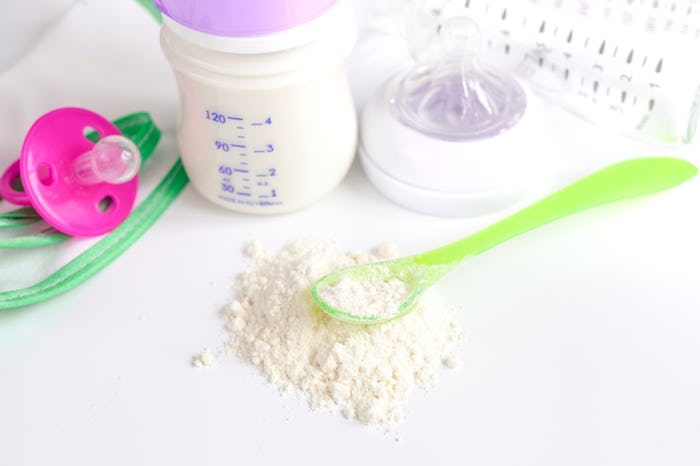Life
These Studies Prove Babies Who Are Formula-Fed Will Be Just Fine
So many moms want to give their kids the healthiest, most nutritious diets throughout their entire childhoods — starting from the moment they're born. And medical professionals and much of the available literature about the ongoing breastfeeding vs. formula debate definitely tend to lead new moms to believe that breastfeeding helps pave the way for optimum health outcomes for their little ones. But a spate of studies on formula-fed babies show that moms should consider professional advice and viewpoints, but ultimately do what's best for themselves and their families. After all, the barriers to breastfeeding are formidable: Some moms are separated from their babies when they go back to work and don't have the time or the space to pump; others have physical impediments. The list goes on.
It's true that breastfeeding, especially when it's maintained for the recommended one year after the baby's birth, has some demonstrated benefits for both mothers and babies. Doing so, Fit Pregnancy and Baby reported, can reduce a newborn's risk of SIDS and lower the risk of premenopausal breast cancer and ovarian cancer for mothers.
But, at the end of the day, there's no reason for moms who can't or simply don't want to breastfeed long-term (or at all) to feel guilty about it. In fact, there's plenty of evidence to suggest that formula-fed babies will be perfectly OK, too.
The IQ Question
It's a commonly held belief that babies who were breastfed for a significant period of time will grow up to be children, and then adults, with higher IQ scores. And as Scandinavian researchers found in a 2001 study of 345 children, this could very well be the case much of the time. The problem? It's also quite likely that correlation does not equal causation in this particular instance.
That's because, as FiveThirtyEight's Emily Oster summarized the results of the study, it wasn't just the breastfed babies who had higher IQ scores. Their mothers were also more affluent, were highly educated, and boasted higher IQs themselves. This evidence depends on a lot of factors as breastfeeding rates "differ dramatically across income, education and race," Oster wrote, adding:
In the U.S. (and most developed countries), white, wealthy women with a lot of education are much, much more likely to nurse their babies than the rest of the population. But these demographic characteristics are also linked to better outcomes for infants even independent of breastfeeding.
So when it comes to IQ, there's a lot more to it than the topic of bottle or breastfed.
Yep, Those Other Factors *Definitely* Have A Role
Different study, similar results. This time, researchers behind a study published in March in the journal Pediatrics found that kids between the ages of 3 and 5 whose moms had breastfed them did better on vocabulary and problem-solving tests, HealthDay reported. They also were found to have fewer behavioral issues. But the researchers — led by Lisa-Christine Girard — came to believe that variables such as the children's moms' education and social class were the determinants.
That's right: not breast milk. Even the link between the 3-year-olds' having been fed breast milk and their struggling less with hyperactivity appears to have dissipated by the time the children in the student reached the fifth birthdays.
How Significant Are The Differences, Really?
Another study, called the PROBIT Trial, did identify some differences in outcomes between babies who were breastfed and those who weren't, according to Philly.com. But the discrepancies were pretty infinitesimal.
Namely, the 9 percent of the babies who were breastfed experienced at least one diarrhea illness, while 13 percent of those in the study who received formula did. There was also a difference in eczema: It plagued 3 percent of the breastfed babies and 9 percent of their counterparts living on formula. And the two groups came down with colds at an identical rate.
Formula Keeps Getting Better & Better
In October 2016, USA Today reported that a new infant formula had been developed to protect a baby's immune system in the same way the breast milk does. Similac Pro-Advance and Similac Pro-Sensitive, a study published in the Journal of Nutrition around that time found, contains good bacteria-supporting prebiotics naturally found in breast milk.
The study ultimately found that of the 200 babies included in the findings, "multiple immune markers of breast-fed babies and babies using the prebiotic formula were nearly identical," according to USA Today.
For this brand of formula, "this is the biggest breakthrough in the last decade," study researchers Dr. Rachael Buck, who also works for the company, told the outlet.
So, clearly, moms who opt to formula-feed their babies aren't doing them the ultimate disservice, not by a long shot. Moms should do what helps them to keep their sanity and best care for their kids, and leave it at that.
Watch Romper's new video series, Romper's Doula Diaries:
Check out the entire Romper's Doula Diaries series and other videos on Facebook and the Bustle app across Apple TV, Roku, and Amazon Fire TV.
